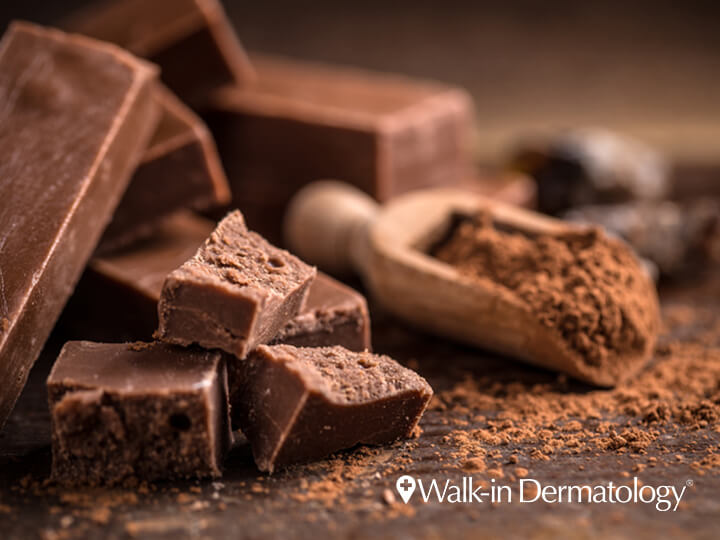Tues: 8:30am - 3:00pm
Wed: 12:00pm - 6:00pm
Thurs: 8:30am - 3:00pm
Fri: Closed
Sat: 8:30am - 12:30pm
Sun: Closed
Greenvale, NY 11548
Is Chocolate Really Bad for Your Skin?


For decades, chocolate has been a prime suspect for causing acne breakouts. It’s actually a myth that has been handed down from generation to generation. Since the 1960s, research has regularly been conducted to see if cocoa actually produces blemishes and pimples.
So is chocolate bad for your skin? Research suggests there is no direct link between the components found in chocolate and skin conditions like acne. Eating an excessive amount of fat and refined sugars may trigger an inflammatory response from the body, leading to acne. On the other hand, chocolate with high cacao content may actually be beneficial to the body since it contains antioxidants and other minerals.
Debunking the Myth
In the 1940s and ’50s, the scientific community held the view that sugary foods cause acne. It was widely thought that people who were acne-prone had an impaired tolerance for glucose, and that their blood sugar was negatively affected by eating chocolate.
It wasn’t until 1969 when people began to suspect that maybe chocolate wasn’t the main culprit in causing acne. Scientists and researchers continued to look for a direct link between cocoa consumption and breakouts, but to this day there is not enough evidence to support the theory.
There are several factors that contribute to skin acne, such as family history, hormones, age, and stress levels. For example, when women are in the premenstrual stage of their cycle, they tend to crave sweets – especially chocolate. This is a time when their hormones are out of balance, so their skin produces excess sebum (oil). The combination of these factors can result in a breakout, so it’s difficult to say conclusively that chocolate is the culprit.
One thing is certain, though: your diet has a lot to do with acne production. A diet high in fat and refined sugars can increase sebum production and boost the inflammatory responses of the body, which will increase the risk of skin blemishes. High glycemic foods such as candy, white bread, and pasta cause acne to flare up or become more severe. Dairy products and many unhealthy fats are also suspected of triggering acne.
So it’s not automatically true that eating chocolate leads to pimples erupting on your face. Rather, chocolate types containing more dairy fat and sugar negatively affect your body. Avoid milk chocolate and white chocolate because these are foods with high glycemic levels.
A well-rounded diet with plenty of greens is the best recipe for clear skin.
What Chocolate Actually Does to Your Skin
Why has the myth of chocolate causing pimples persisted? Chocolate contains sugar, dairy, and fats that do contribute to acne production. Here is what consuming a large amount of these ingredients will do to your body:
- Sugar: Anything with added sweeteners like sugar will affect your skin negatively. Processed sugar contributes to early aging, as it breaks down skin cells and works against collagen and elastin production. Aside from causing premature aging, excess sugar also triggers inflammation and sebum production.
- Dairy: Dairy products like milk contain lactose, which is a form of sugar. Aside from the sugar, dairy also contains proteins that make your body prone to inflammation. Digesting these proteins will release a hormone that confuses our endocrine system, which may lead to a breakout.
- Fats: Food that is high in saturated fat or trans fats are harmful to your health, since they spike cholesterol levels. They are also responsible for increasing inflammation in the body, which contributes to the appearance of acne.
The Benefits of Chocolate for Your Body
Rather than picking up a milk chocolate or white chocolate bar filled with sugar and fat, you can opt to buy chocolate with higher cocoa content. Pure, dark chocolate and cacao are rich in antioxidants, which are beneficial to your skin and overall health. Here are some ways dark chocolate helps your body:
1. Provides antioxidants
Dark chocolate is loaded with antioxidants, or compounds that inhibit free radicals from destroying the body’s cells. The flavanols, polyphenols, and catechins in cocoa function with even more antioxidant activity compared to acai berries and blueberries.
2. Supplies vitamins, minerals, and fiber
A 100-gram bar of dark chocolate with 70% to 85% cocoa content contains a significant amount of fiber, iron, copper, magnesium, manganese, potassium, zinc, phosphorus, and selenium. Moderate consumption of dark chocolate will supply your body with these nutrients.
3. Lowers bad cholesterol levels
Combined with a low-fat diet, dark chocolate can lower low-density lipoprotein (LDL) cholesterol levels. This “bad” cholesterol is responsible for damaging tissues such as the lining in your heart arteries, so dark chocolate can support your cardiovascular health.
Treat Your Acne Today at Walk-in Dermatology
If you’re worried about acne and pimple breakouts, visit us at Walk-in Dermatology. Our board-certified dermatologists offer a variety of treatments and procedures that can treat those blemishes and make your skin look fresh and healthy. Book your appointment with us today.








